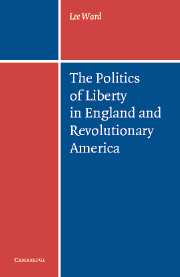Book contents
- Frontmatter
- Contents
- Acknowledgments
- Introduction: Reexamining the Roots of Anglo-American Political Thought
- PART ONE THE DIVINE RIGHT CHALLENGE TO NATURAL LIBERTY
- PART TWO THE WHIG POLITICS OF LIBERTY IN ENGLAND
- PART THREE THE WHIG LEGACY IN AMERICA
- 12 British Constitutionalism and the Challenge of Empire
- 13 Thomas Jefferson and the Radical Theory of Empire
- 14 Tom Paine and Popular Sovereignty
- 15 Revolutionary Constitutionalism: Laboratories of Radical Whiggism
- Conclusion
- Bibliography
- Index
13 - Thomas Jefferson and the Radical Theory of Empire
Published online by Cambridge University Press: 28 October 2009
- Frontmatter
- Contents
- Acknowledgments
- Introduction: Reexamining the Roots of Anglo-American Political Thought
- PART ONE THE DIVINE RIGHT CHALLENGE TO NATURAL LIBERTY
- PART TWO THE WHIG POLITICS OF LIBERTY IN ENGLAND
- PART THREE THE WHIG LEGACY IN AMERICA
- 12 British Constitutionalism and the Challenge of Empire
- 13 Thomas Jefferson and the Radical Theory of Empire
- 14 Tom Paine and Popular Sovereignty
- 15 Revolutionary Constitutionalism: Laboratories of Radical Whiggism
- Conclusion
- Bibliography
- Index
Summary
Thomas Jefferson's Summary View of the Rights of British America differed in both form and substance from the work of earlier colonial spokesmen like Otis and Dickinson. Written in the highly charged atmosphere of 1774, the Summary View was originally intended as a set of instructions for the Virginia delegation to the First Continental Congress, a distinguished group including Patrick Henry, Edmund Randolph, and George Washington. It was, however, soon recognized to be much more than that, as much a statement of general principles underlying the colonial resistance to British rule as a specific set of proposals to resolve the imperial crisis. As such it was later published anonymously and was a major contribution to the pamphlet war between the colonists and Britain. In contrast to earlier colonial statements of their rights, the Summary View put much less emphasis on the painful details and dangerous implications of parliamentary efforts to tax the colonies, and dealt primarily with the constitutional and philosophical issues raised by the Coercive Acts disabling the Massachusetts Assembly and by the Act Suspending the New York Legislature. In this sense, Jefferson responded to the rapidly deteriorating situation affecting imperial relations in the early 1770s. By 1774 Otis and Dickinson's nightmare scenario, the theoretical possibility that Parliament could annihilate colonial self-government, had become a practical reality in at least two colonies and an increasingly likely possibility in the others.
- Type
- Chapter
- Information
- The Politics of Liberty in England and Revolutionary America , pp. 351 - 374Publisher: Cambridge University PressPrint publication year: 2004



